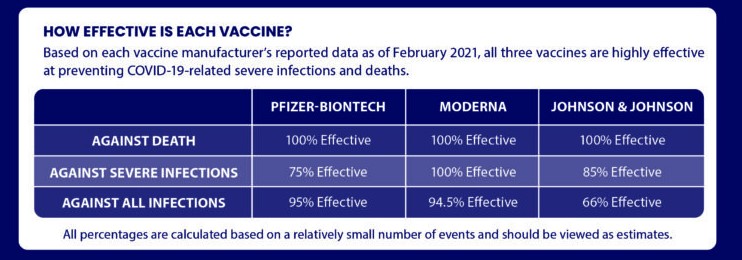Job No. 1: Get Vaccinated
Don’t seek the ‘best’ vaccine, Northwestern coalition experts say
The U.S. Food and Drug Administration reports what appears to be a large gap in the effectiveness of vaccines aimed at protecting the public against COVID-19.
But experts from Northwestern University COVID-19 Vaccine Regulatory Consortium (CoVAXCEN) said in reality the three vaccines with emergency use authorizations are all highly effective in preventing severe COVID-19 infections and deaths. They urged the public not to bother trying to strategize on how to get one vaccine versus another because of differences in effectiveness and to obtain whichever vaccine is most readily available.
“It is difficult even for specialists to strategize around this,” said CoVAXCEN member Eustache Paramithiotis, PhD, vice president of Research & Development for CellCarta, the Montreal-based vaccine development company.
“The principle that we’re operating on is to get vaccinated. If you can get vaccinated that’s a lot better than not getting vaccinated.
“As to which one? Unless you have some very specific situation, such as an allergy, it’s best to get whatever vaccine that is available to you.”
Stefanie Demetriades, PhD, a health communications researcher for CoVAXCEN, noted that the FDA has reported a variety of numbers on the clinical study-based efficacy and real-world effectiveness of the three vaccines which the FDA granted emergency use authorization.
But she said the most important statistic is that the three vaccines the FDA has authorized were all 100% effective against the immunized patients dying of COVID-19 in clinical trials.
There are differences between the vaccines on various measures, according to Paramithiotis, an immunologist, and variation in the timing and conditions of each clinical trial makes it impossible to do a direct, head-to-head comparison of vaccine efficacy.
However, he said differences in the exact efficacy numbers should not distract from the overwhelming evidence that all three are highly effective in preventing deaths and severe disease.
Here are FDA comparisons of the vaccines:
- The Pfizer-BioNTech COVID-19 Vaccine, to which the FDA gave emergency authorization in December, is 75% effective in preventing severe disease compared with 85% effectiveness with the Moderna COVID-19 Vaccine, authorized in December, and 100% with the Johnson & Johnson COVID-19 Vaccine, authorized in March.
- The Moderna disease is 100% protective against severe disease compared with 85% protection with Johnson & Johnson and 75% with Pfizer.
- Pfizer and Moderna vaccines are 95% effective in preventing all infections while the Johnson & Johnson vaccines are 66% effective, the FDA reported in February.
These results are well above the 50% effectiveness the FDA uses to approve vaccines, such as annual influenza vaccines, Paramithiotis noted.
Why are there differences between the vaccines?
Paramithiotis explained that the likely differences in the numbers are the result of the Pfizer and Moderna vaccines being studied and authorized before the appearance of the first variant (United Kingdom, or B.1.17).
(This new strain was identified in Kent, England in September 2020, 10 months after the discovery of the “prototype” virus in Wuhan, China. B.1.17 became the dominant COVID-19 virus in the U.S. in April 2021.)
In contrast, patients immunized with the Johnson & Johnson vaccine potentially had been exposed to the British variant so effectiveness of the vaccine can vary as measured in clinical studies.
Paramithiotis said as a result of the timing of testing, response rates to the vaccine also may vary between vaccines.
Research on the three vaccines looked at different biological factors and used different dosing schedules.
Paramithiotis also observed that the results may be skewed by the clinical studies focusing primarily on healthy adults. He added that people with chronic inflammatory diseases, such as those with diabetes or heart disease, were not part of the study groups.
He said that risk profiles may change when the entire population is tested. “When you roll these vaccines out to everybody, you’re also going to include unhealthy adults, and some of them may be more at risk of additional side effects or more pronounced side effects than the people in the trial.
“A trial with 30,000 people is going to have different results than rolling out a medication to 300 million people. It’s almost unavoidable.”
Studies also show differences because the Pfizer and Moderna vaccines are delivered in two doses at different intervals, and Johnson & Johnson follows a single-shot schedule, known as “one-and-done.”
“The bottom line is that the vaccines can’t be compared directly. They’re apples and oranges,” Paramithiotis said. “So again, get whatever vaccine you can, and you’ll be protected.”
The Northwestern COVID-19 Vaccine Communication and Evaluation Network (CoVAXCEN) brings together a panel of experts in immunology, infectious disease, epidemiology, regulatory science, and health communication.
Headquartered in the Institute for Global Health's Center for Global Communicable and Emerging Infectious Diseases with the cooperation of the Center for Communication and Health, CoVAXCEN seeks to achieve consensus on a variety of issues related to the safety and efficacy of COVID-19 vaccines and then produce and disseminate written materials for scientists, healthcare professionals, and the general public describing its conclusions.

Source: Public Health Communications Collaborative